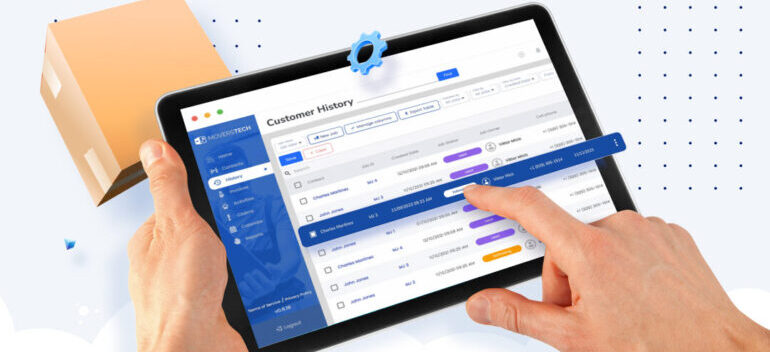Missed calls, slow follow-ups, and messy schedules can cost movers thousands each year. Often, the real issue is a CRM that does the bare minimum. A strong system should help you close more sales, keep operations smooth, and make customers happier. Why should movers demand more from their CRM? MoversTech CRM will help you understand. We will show you what to expect from a top-tier CRM and how the right features can improve your moving business.
How CRMs have changed the way movers work
Not long ago, many moving companies treated their CRM as little more than a digital address book. It stored names, phone numbers, and maybe a few job details, but it didn’t help drive business growth. Things have changed.

Today’s CRMs are central to managing the entire customer journey. From the moment a lead comes in to the final invoice, a modern CRM can track every interaction, automate key steps, and give you data to improve your results. This shift means movers now have the chance to work smarter, respond faster, and compete more effectively in a crowded market.
That’s why movers should demand more from their CRM. It’s no longer just a nice-to-have tool. It’s a system that can shape how you sell, serve, and grow.
The cost of sticking with a basic CRM
A CRM with limited features can quietly drain your business. Missed follow-ups mean leads go cold before you have a chance to book them. Without automated reminders or clear tracking, sales opportunities slip away.
Inefficient scheduling can also cause problems. Double bookings, last-minute changes, and unclear crew assignments create stress for your team and frustration for customers. A basic CRM often requires extra manual work to fix these issues, which takes time away from selling and serving clients.
Reporting is another weak point. Without detailed data, it’s hard to see which marketing efforts work, where your revenue comes from, or what needs to improve. In the end, sticking with a basic CRM costs far more than upgrading to one that truly supports your business.
Features movers should demand from their CRM
A CRM should do more than store customer details. It should actively help you secure more jobs, keep operations organized, and deliver a better experience for every client. To grow, you need tools that streamline the entire process from lead capture to final payment.

These are the features to look for in a high-performing CRM:
- Lead management and automated follow-ups
- Integrated scheduling and dispatch
- Document and contract handling
- Accurate estimates and quoting
- Real-time communication tools
- Detailed reporting and analytics
Lead management and automated follow-ups
A good CRM makes it easy to capture leads from various sources like your website, social media, and referral partners. Once the lead is in the system, automated follow-ups keep the conversation going without requiring manual reminders. This ensures no potential customer is forgotten and gives you a better chance of booking the job. Movers who consistently follow up quickly often secure more business than competitors who take days to respond.
Integrated scheduling and dispatch
Scheduling is one of the most complex parts of running a moving business. A CRM with built-in scheduling and dispatch tools keeps your calendar, crews, and trucks in sync. When you streamline dispatch, you avoid double bookings and last-minute confusion. Clear visibility of your schedule means your team knows exactly where they need to be and when, which improves efficiency and customer satisfaction.
Document and contract handling
Paper contracts slow things down and increase the risk of losing important documents. A CRM that allows you to create, store, and sign contracts electronically speeds up the booking process. You can also manage estimates, bills of lading, and other important records in one secure location. This keeps all necessary documentation organized and accessible whenever you need it.
Accurate estimates and quoting
Creating accurate estimates is a critical part of building trust with customers and avoiding costly disputes. A good CRM can store inventory lists, track past jobs, and use that information to generate precise quotes. Errors in weight or volume calculations can lead to unexpected costs that damage your reputation. Understanding weight estimates for moving is an important step toward making sure your quotes are fair, transparent, and based on the right data. Integrating this knowledge with your CRM’s quoting tools ensures customers know exactly what to expect.
Real-time communication tools
Keeping customers informed builds trust and reduces misunderstandings. With real-time communication tools, your CRM can send automatic updates via email or text when a crew is on the way, when a change occurs, or when a job is complete. Effective customer communication keeps both your team and your clients on the same page without extra phone calls or manual messages.
Detailed reporting and analytics
Data helps you make better business decisions. A CRM with robust reporting tools can show you where your leads come from, how many turn into booked jobs, and which services bring in the most revenue. These insights let you focus your marketing budget where it works best and spot opportunities to improve operations. Over time, this data-driven approach can lead to more consistent growth and higher customer satisfaction.
How to choose a CRM that delivers more
Not every CRM will meet a moving company’s needs. Use these points to find one that truly supports your business:
- Identify your main challenges. Know whether you need better lead tracking, smoother scheduling, faster quoting, or all of the above.
- Choose industry-specific features. Look for dispatch tools, inventory tracking, and integrated billing designed for movers.
- Check ease of use. Make sure your team can learn and use the system quickly so adoption is smooth.
- Evaluate integration options. Ensure it connects with your accounting, marketing, and communication tools.
- Confirm support and training. A good vendor offers onboarding, updates, and fast help when issues arise.
Action steps for movers
If you already have a CRM, start by reviewing how it performs against your current needs. List the features you use often, the ones you rarely touch, and the gaps that cause daily frustrations.

Reach out to your team for feedback. They may notice issues you don’t see, like slow loading times or confusing navigation. Compare your current system with other CRMs in the market that are designed for movers.
Finally, create a shortlist of options and arrange demos. Seeing how each system handles lead tracking, scheduling, and reporting will help you choose one that can truly improve your operations.
Raise your expectations
Settling for a basic CRM limits your ability to grow, serve customers well, and run operations efficiently. The right system can help you capture more leads, keep schedules organized, and make informed decisions based on accurate data. Why should movers demand more from their CRM? Because it can be the difference between struggling to keep up and building a business that thrives. By knowing what features matter and choosing a solution that matches your needs, you set your moving company up for long-term success.

